Press ReleasesCivic Literacy
ACTA Testifies in Favor of New Civic Centers at OSU and the University of Toledo
Today, representatives from the American Council of Trustees and Alumni (ACTA) testified before...
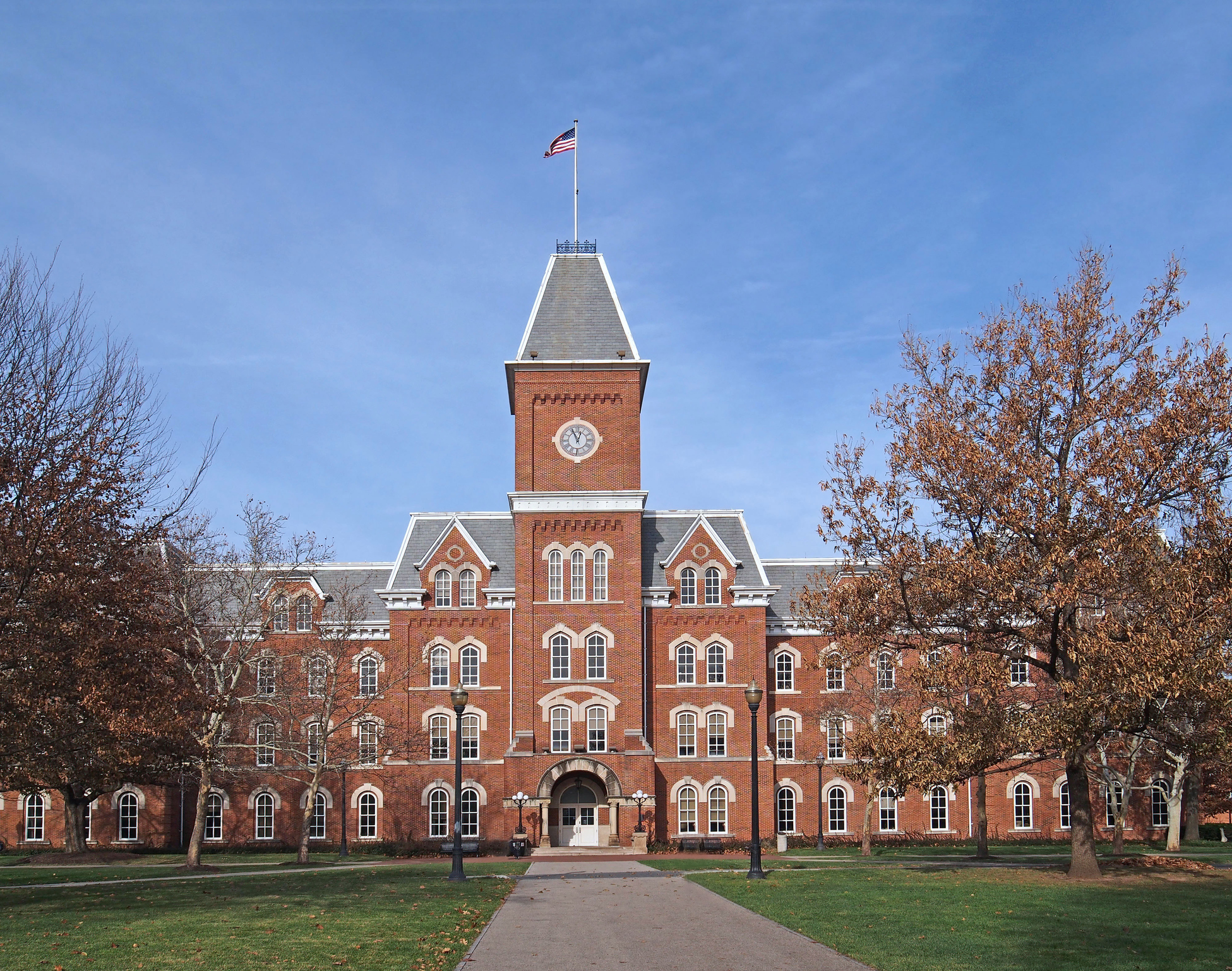
Building and supporting a campus culture that embraces free expression and viewpoint diversity depends on the implementation of strong policies and ongoing intentional effort. Following Ohio Revised Code Section 3345.0215, which requires Ohio’s public universities to adopt a policy affirming the principle of free speech, The Ohio State University (OSU) makes the following statement on its website:
“The Ohio State University takes seriously its role in promoting and supporting public discourse. We are steadfastly committed to protecting the First Amendment right to free speech and expression on our campuses. Encouraging individuals to share their varying thoughts and perspectives enriches the university environment and can allow community members to experience new ideas.” —The Ohio State University
This is a welcome statement, but a new survey by the American Council of Trustees and Alumni (ACTA) and College Pulse shows that it is not enough on its own to generate a campus culture where free expression and viewpoint diversity can thrive. Our survey reveals that many OSU students do not feel encouraged to express themselves—or to allow others to express themselves—freely.
Conducted during the 2022–23 academic year and collecting 2,003 unique responses, our survey shows that OSU undergraduate students are:
• too eager to shout down guest speakers;
• prone to self-censorship; and
• unclear about the university administration’s support for free speech.
Our results also reveal that the OSU community struggles to embrace viewpoint diversity, as there are stark differences between the experiences of liberal and conservative students:
• Liberal students are much more willing than conservatives to shout down invited speakers.
• Conservative students are more likely than liberal students to self-censor.
• Conservative students are more likely than liberal students to have friends with different political views.
• Conservative students are much more likely to self-report having lost friends due to political beliefs.
These patterns call into question whether OSU is preparing students for participation in our pluralistic society and living up to its motto, “Education for Citizenship.” If students are self-censoring and not regularly hearing from peers with political views other than their own, will they be prepared to talk with fellow citizens who hold different viewpoints? If they are willing to silence other viewpoints instead of hearing them out, will they be able to treat others with civility and respect after they graduate?
• Only one-third of students (32%) said shouting down a campus speaker is never acceptable.
Thirty-five percent of respondents said that it is “always acceptable” or “sometimes acceptable” to shout down an invited speaker, a result that should worry OSU’s leaders in the wake of recent high-profile shout-downs of Ann Coulter at Cornell University, Judge Stuart Kyle Duncan at Stanford Law School, and Ian Haworth at the University at Albany. There are clear, significant differences in willingness to censor based on ideology. More than half of liberal OSU students (54%) said they thought that shouting down a speaker with whom they disagreed was always or sometimes acceptable, a rate about four times that of conservatives. Over half of our conservative sample said that shouting down speakers was never acceptable. The moderate students were slightly more likely than average to find shout-downs rarely or never acceptable
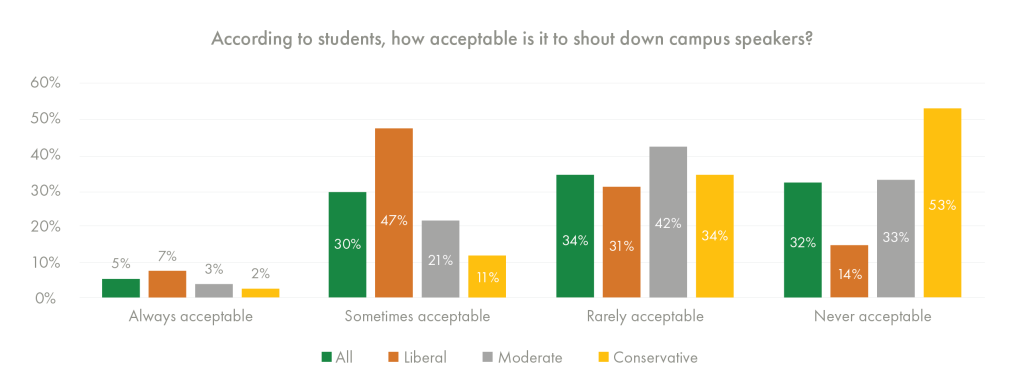
• Half of all students (50%) and 3 in 4 conservative students (76%) reported feeling they could not express themselves at least occasionally.
When asked how often they have felt they could not express an opinion because of how students, a professor, or the administration would respond, 50% of respondents said at least “occasionally,” while 21% said “fairly often” or “very often.” These overall numbers are troubling for the state of free expression among the student body at OSU. The differences between conservatives and liberals are even more alarming. While 9% of liberal students said they self-censor “fairly often” or “very often,” a disturbingly high 51% of conservative students said the same. The rate of conservatives who found their administration’s support of free speech “not very clear” or “not at all clear” (51%) matches the rate of conservatives who felt they could not express their opinion “fairly often” or “very often.”
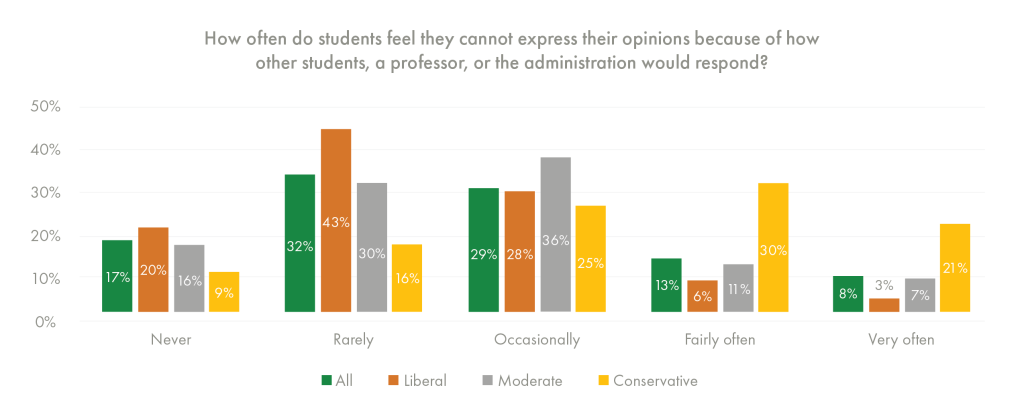
When students were asked how often they decided not to speak up because they thought their opinion would be unwelcome, the patterns are similar.
• Four in 10 students (40%) and more than 6 in 10 conservative students (63%) reported not speaking up at least once a month because they thought their views would be unwelcome.
Our survey indicates that conservative students are seriously worried about judgment from others for voicing their opinions. Forty-five percent of conservatives said that they do not speak up at least several times a month because they fear that what they say would be considered unwelcome. Just 16% of liberals said the same. Meanwhile, 7 in 10 liberals said they never stop themselves from speaking up or stop themselves less than once a month; for conservatives, that rate falls to 4 in 10.
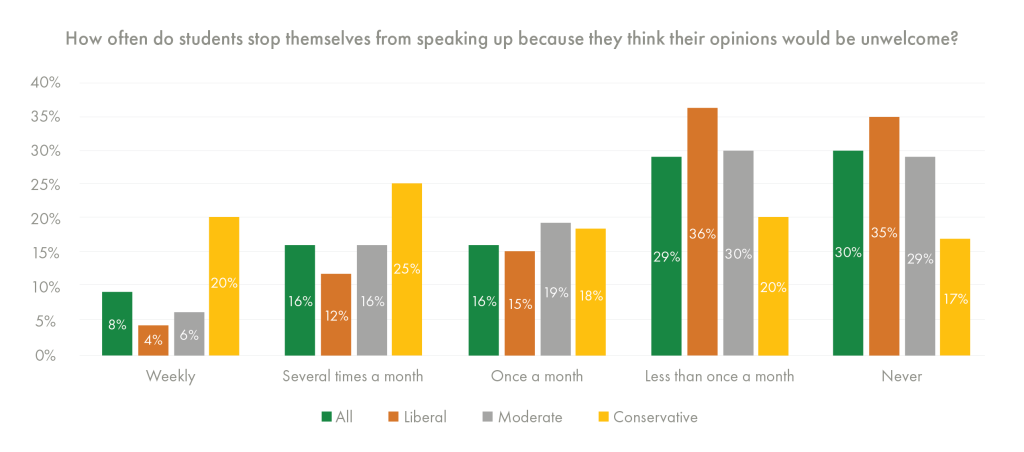
These numbers are likely due at least in part to political imbalance among the student body. We asked our sample to place itself on a nine-point ideological scale. Our results are mostly in line with the findings of large-scale polls conducted at major public universities: On campus, there are more liberals than conservatives, with some moderates and some who do not consider themselves on the normal left-to-right ideological spectrum.1
• Among the students we surveyed, 48% described their political beliefs as liberal, while only 23% described their beliefs as conservative.
To compare OSU with other Midwestern public universities, Michigan State University’s student body is estimated to be 44% liberal and 20% conservative, and Indiana University’s student body is estimated to be 44% liberal and 24% conservative, per the Foundation for Individual Rights and Expression’s 2022 College Free Speech Rankings.2 Conservatives are a minority at OSU, but they do not appear to be outnumbered at a worse rate than those attending similar universities.
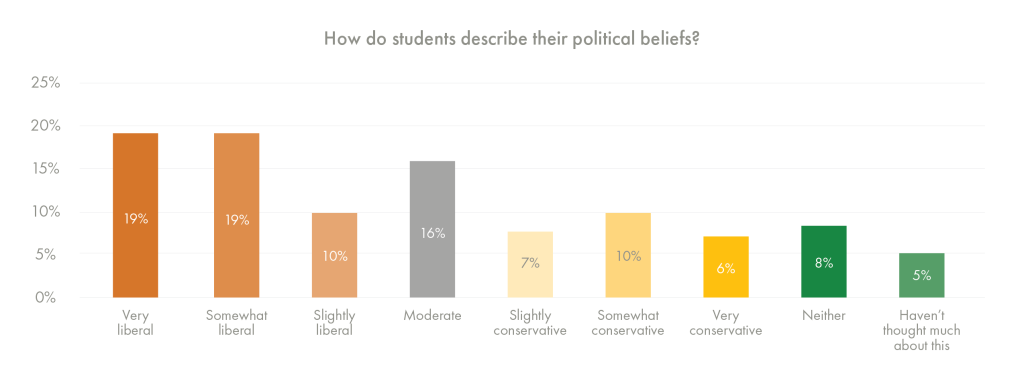
In light of this political imbalance, we found that conservatives were much more likely than liberals to say that “most” or “many” of their friends on campus hold different political ideologies than their own. Correspondingly, liberals were significantly more likely to say that they had “just one or two” or “no” friends of a different political persuasion.
• Seven in 10 liberal students (71%) reported having few to no friends with different political beliefs. Only 1 in 3 conservative students (33%) said the same.
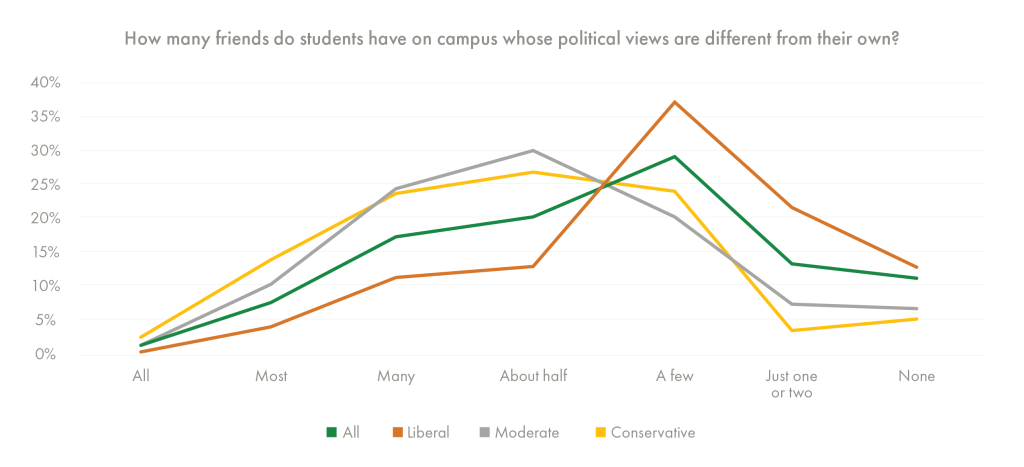
• Almost 3 in 10 conservative students (28%) reported having lost friends due to their political views, compared to only 1 in 10 liberal students (8%).
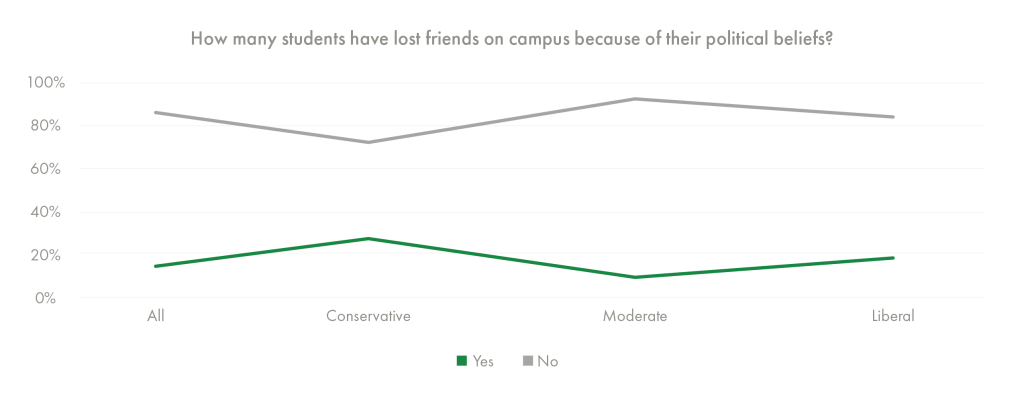
Finally, we asked students how clear it is that their university administration protects free speech on campus.
• One-third of all students (32%) and half of conservative students said it is “not very clear” or “not at all clear” that the university administration protects free speech on campus.
The results suggest that the OSU administration can do more to communicate a commitment to free expression on campus. Once again, there was a significant difference between conservative and liberal students. Just over half (51%) of conservatives said it is “not very clear” or “not at all clear,” compared to 21% of liberals.
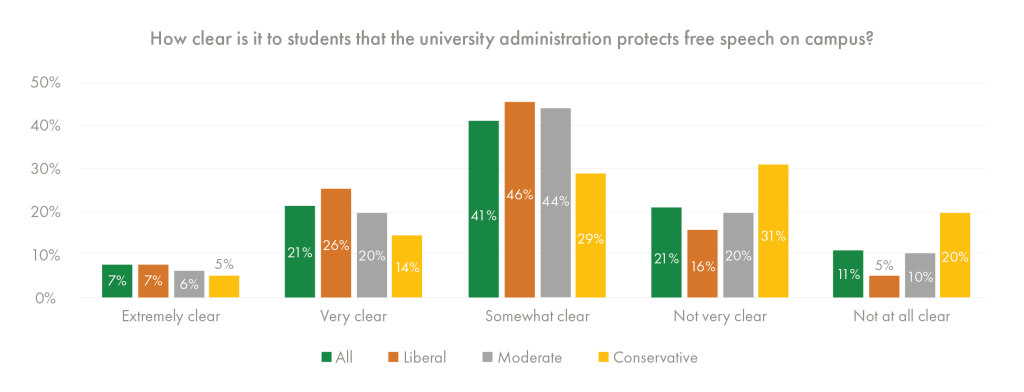
Our data show that OSU has a great deal of progress left to make on protecting and promoting free expression on campus. The administration should build on its free expression policy to cultivate a campus culture that embraces intellectual diversity and encourages free speech. We urge the university to begin implementing the recommendations outlined in ACTA’s Gold Standard for Freedom of Expression™. Specifically, OSU should adopt a policy on institutional neutrality; make merit in teaching, research, and service the only criterion for faculty hiring; and add a program on free expression to new student orientation.
This survey was designed and conducted by College Pulse from September 2022 to March 2023. Interviews were conducted in English among a sample of 2,003 undergraduate students who are currently enrolled at The Ohio State University.
The initial sample was drawn from College Pulse’s Undergraduate Student Panel. Panel members are recruited by a number of methods to help ensure diversity in the panel population, including web advertising, permission-based email campaigns, and partnerships with university organizations.
To reduce the effects of any non-response bias, a post-stratification adjustment was applied based on demographic distributions from the 2017 Current Population Survey (CPS). The post-stratification weight rebalanced the sample based on the following benchmarks: age, race and ethnicity, and gender. The sample weighting was accomplished using an iterative proportional fitting (IFP) process that simultaneously balances the distributions of all variables. Weights were trimmed to prevent individual interviews from having too much influence on the final results.
The margin of error for this survey is ±2%. Margins of error are typically calculated on probability-based samples and are not technically correct for non-probability online samples. We supply them here to provide a general assessment of error ranges that may be associated with the data.
Q1: How acceptable would you say it is for students to engage in the following action to protest a campus speaker: Shouting down a speaker or trying to prevent them from speaking on campus.
1) Always acceptable
2) Sometimes acceptable
3) Rarely acceptable
4) Never acceptable
Q2: On your campus, how often have you felt that you could not express your opinion on a subject because of how students, a professor, or the administration would respond?
1) Never
2) Rarely
3) Occasionally
4) Fairly often
5) Very often
Q3: How often have you not spoken up on campus because you thought your opinion would be unwelcome?
1) Weekly
2) Several times a month
3) Once a month
4) Less than once a month
5) Never
Q4: Using the following scale, how would you describe your political beliefs?
1) Very liberal
2) Somewhat liberal
3) Slightly liberal
4) Moderate/middle of the road
5) Slightly conservative
6) Somewhat conservative
7) Very conservative
8) I do not identify as a liberal or a conservative
9) Haven’t thought much about this
Q5: How many friends on campus do you have who adhere to a different political ideology?
1) All
2) Most
3) Many
4) About half
5) A few
6) Just one or two
7) None
Q6: Have you lost friends on campus because of your political beliefs?
1) Yes
2) No
Q7: How clear is it to you that your college administration protects free speech on campus?
1) Extremely clear
2) Very clear
3) Somewhat clear
4) Not very clear
5) Not at all clear
1Foundation for Individual Rights and Expression and College Pulse, “2023 College Free Speech Rankings,” Overall Rankings, https://rankings.thefire.org/rank. Out of 44,847 students surveyed at 203 colleges and universities, 33% identified as Democrat, 12% as Republican, 45% as Independent, and 11% as Other. See also Knight Foundation and Ipsos, College Student Views On Free Expression and Campus speech 2022: A Look at Key Trends in Student Speech Views Since 2016 (Miami, FL: Knight Foundation, 2022), https://knightfoundation.org/reports/college-student-views-on-free-expression-and-campus-speech-2022/. The survey included 1,023 college students, of whom 37% were Democrats, 21% were Republicans, and 41% were Independents; and William F. Buckley, Jr. Program, National Undergraduate Study (McLaughlin & Associates, 2022), https://buckleyinstitute.com/buckley-program-releases-eighth-annual-college-student-survey/. When asked, “With which political party are you affiliated?”, 36.2% of respondents answered Democrat, 17.8% answered Republican, and 29.2% answered Independent/Non-affiliated.
2Foundation for Individual Rights and Expression and College Pulse, “2023 College Free Speech Rankings,” Overall Rankings, https://rankings.thefire.org/rank.
Today, representatives from the American Council of Trustees and Alumni (ACTA) testified before...
Higher Ed Now continues its series of conversations with leading lights in the surging national movement to foster viewpoint diversity and free expression on college campuses. Today’s episode spotlights two leaders at the University of Delaware – a major institutional partner in the college debates and discourse work that ACTA is doing with Braver Angels and BridgeUSA.
Does Cornell University President Martha Pollack really have the “cojones” to end university policies that conflict with free expression and stifle intellectual diversity? Comedian and Cornell alumnus Bill Maher seems to think so, since he recently gave President Pollack the first ever “Cojones Award” for turning down a student request to mandate trigger warnings.
Launched in 1995, we are the only organization that works with alumni, donors, trustees, and education leaders across the United States to support liberal arts education, uphold high academic standards, safeguard the free exchange of ideas on campus, and ensure that the next generation receives an intellectually rich, high-quality college education at an affordable price.
Discover MoreSign up to receive updates on the most pressing issues facing our college campuses.